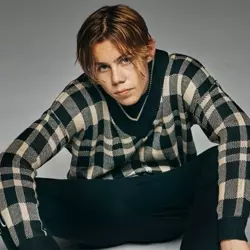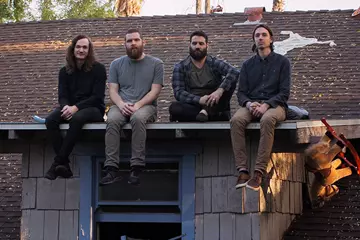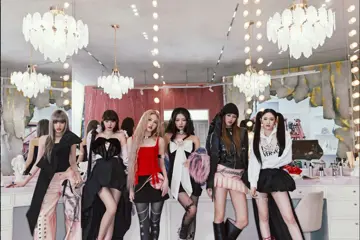 The Kid LAROI
The Kid LAROIJust which superstar acts will McDonald’s use to soundtrack its ambitious global growth plans?
In December 2023, the $212 billion company announced plans to increase the number of its global locations from 41,000 to 50,000 by 2027. It will be “the fastest period of growth in company history,” Maccas said, and comes after its Q3 2023 earnings exceeded expectations – growing 8.8 percent globally and 8.1 percent in America.
Music will be essential to deliver the message. Based on Maccas’ past strategies, the acts must have superstar status with a strong affinity to fans, tribe and community; they must also have a strong social presence, and be recognised as long time Maccas-munchers.
When it comes to a brand using music to create uber-loyalty and dedication, McDonald's has notched up enough marketing awards to be in front of the field. And their approach? Whether it’s marketing to a hip-hop, Latino or gaming crowd, the company does its research to totally understand who its “fans” (note: never “customers”) are and how their lives are changing, and get a real handle on their community.
So explained American marketing guru Dr. Marcus Collins, author of For The Culture: “You wanna play in my culture? You better know what you’re talking about. If not, you’re gonna get fried.”
Don't miss a beat with our FREE daily newsletter
He elaborated in Dan Runcie’s podcast Trapital: “It’s understanding not what is popular but why are these things meaningful, and where we have licence to be part of it. Marketers have become more savvy, and so have that expectations of consumers.”
The Travis Scott Deal
In 2020, McDonald’s took its first real step in music star endorsements with the Travis Scott Meal. The rapper was red-hot in the charts, and red-hot in the looks. Everyone wanted to be like him.
It also managed to reek authenticity. The $6 Scott Meal – a Quarter Pounder with cheese topped with lettuce and bacon, medium fries with BBQ sauce and a Sprite – was exactly what he’d been ordering as a kid growing up in Houston, Texas. He’d been posting his love for the meal on social media long before the deal. Kids could imagine going into a Maccas store with him. Within weeks of the campaign launching in September 2020, an ad for the meal racked up over four million views on YouTube.
Such was the star’s affinity with his fans, many ordering the meal would simply say, “Give us a Cactus Jack” – referencing Scott’s record label – or simply drive up to the window with his music blaring loudly. Some outlets found demand three times more than expected, and often ran out of the meal’s ingredients in the first week. Posters for the campaign were ripped off walls and found on eBay.
Scott made $20 million, with a $5 million fee and $15 million worth of merchandise sales. The merch – ranging from t-shirts to McNugget-shaped body pillows – were designed by the Cactus Jack apparel line, and kept selling after the campaign finished. The deal also called for Scott to design uniforms for McDonald’s employees, and for Maccas to contribute to neighbourhood initiatives chosen by the rapper.
Over the four-week campaign, McDonald’s revenue increased by $50 million, and the financial sector added an extra $10 billion to its market value. Marketing agencies reported the Scott deal helped it “connect with an audience that’s been a weak spot over the past 20 years” – the 11-to-24-year-olds.
Maccas quickly followed with deals for reggae star J Balvin (a Big Mac without pickles, fries and ketchup, and an Oreo McFlurry), Californian rapper Saweetie, and Mariah Carey.
The BTS meal came with ten Chicken McNuggets, medium fries and a Coke, and sides of cajun and sweet chili sauces, in a collectible purple box. McDonald’s executives announced the BTS tie-up boosted sales internationally by 40 percent, and made up 25 percent of a rise in US sales. The ad got another four million YouTube views.
In South Korea, daily sales of McNuggets leaped by 250 percent for four weeks after the deal launched. In Indonesia, there was such a rush that Maccas had to close for fear of breaching COVID restrictions. In Malaysia, the Philippines and Vietnam, Maccas says the BTS Army (their official fanbase) “went out of their way to prepare snacks for our crew and managers to support them on launch day”.
The Kid LAROI was the first Australian artist to score his own meal, first appearing in May 2022 and including a cheeseburger with no pickles, medium fries, medium frozen Coke, six Chicken McNuggets and BBQ sauce. He said as a teenager that he was a constant visitor to his local Maccas in Waterloo, Sydney. The campaign coincided with his triumphant sold-out homecoming tour. As a result, it got the rapper a lot of mainstream coverage, with him and his entourage dropping into Maccas before or after shows to eat, serve customers, and have a singalong with fans. These drew big crowds – a nightmare for his security team.
LAROI did a second Maccas campaign in September 2023, testing the McCrispy chicken burger. It worked enough to be expanded into America, and is set to be on all global menus by the end of 2025. The McDonald’s collab “has had a significant impact on [LAROI’s] career,” stated Design Wave Media CEO D. Erving. “[It] not only elevated his visibility on a global scale but also solidified his status as a mainstream artist.”
Bolden Arches
McDonald’s was using sports stars like Michael Jordan and Larry Bird to sell its brand from 1992. But they were lowkey and only used in one-off cities. The fast food chain relying on superstar acts makes more sense when you look at the bad shape its morale was in during the 2000s. It was the time of documentaries like Supersize Me and Fast Food Nation, as the US battled hypertension and an obesity epidemic.
“McDonald’s were the biggest players in the space, so they became the punching bag for everything that was wrong with the American diet,” Dr. Collins explained in the Trapital podcast. Panicked into taking on the “villain” role, the company introduced salads that customers really didn’t take to.
It was only in 2019, when McDonald’s switched to a new agency – Wieden+Kennedy – that the message changed. The agency told its executives: “Yes, a lot people hate you but 68 million people turn up at your door every single day. That’s a lot of love. Why don’t you focus on the love?”
This led to “Fan Truths”, asking celebrities and customers to relay their “fan experiences” at McDonald’s. It emphasised how being a McDonald’s muncher was part of their identity. Seen putting in their Maccas orders were Kanye West, the Kardashians, Magic Johnson, Whoopi Goldberg, Back To The Future’s Marty McFly, Dracula (ketchup straight), Julius Caesar (the Caesar Salad) and Romeo & Juliet (sharing a milkshake). Once the brand understood the importance of community, the music collabs were a quantum leap.
Collins summed up: “McDonald’s understood they were not consumers but fans and part of a community.” It was not about “tell people how much you love McDonald’s, this is the way you project your identity. Music is not the hero, the heroes are the fans. It’s not about the style of music but understanding the nuances of fandom.”
Lord Of The Fries
What do Pharrell Williams, Seal, Macy Gray, Andie MacDowell, Mark Hamill, Jay Leno and Jeff Bezos all have in common? They were among the estimated 20 million who worked for McDonald’s at the start of their careers.
Pharrell was fired three times from the Golden Arches. "At a certain point they just realised I was no help," he joked on Late Night with Seth Meyers. "I was only good at eating the chicken nuggets.” But in a twist of fate in 2003, Williams co-wrote the Justin Timberlake song I'm Lovin' It, which became the fast food giant’s longest-running jingle. In its year of release, McDonald’s spent $1.37 billion on advertising, with five change of ads and eleven languages.
It made Timberlake $6 million, while Pharrell’s bank account was rumoured to have increased by half a million chalupas. That’s a lot of burgers to flip.















